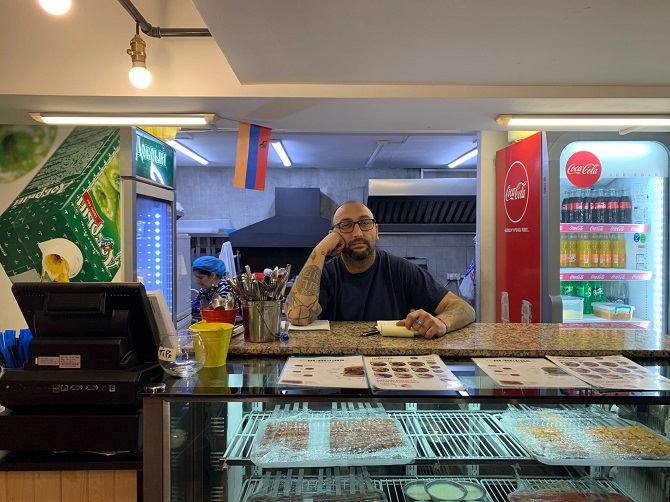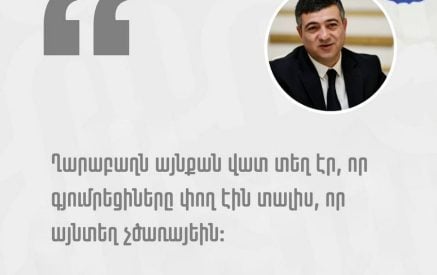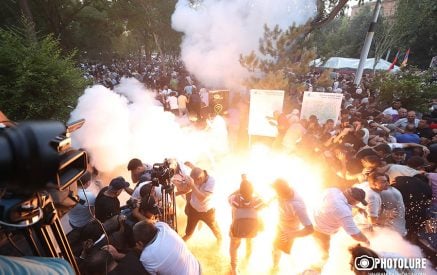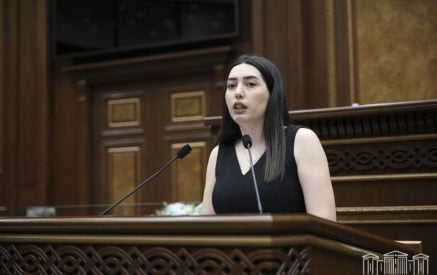The Armenian Weekly. Small business owners confronting a wave of break-ins plaguing the city over the past year are demanding action from the police.
Zak Valladian, a repat from Dubai, told the Armenian Weekly that his popular downtown eatery Adzoukh was hit four times by burglars this year alone. Thieves allegedly stole cash from the register in the first incident, but were less successful in later attempts. The police inspector who had investigated the first break-in responded with “oh well” when Valladian called him on the second occasion. “By the fourth burglary, I didn’t even bother calling the cops,” he said.
Another repat restaurateur also reported three separate break-ins over the span of three months. “The police came, took security footage, filed a report and left without any follow-up,” they said. A nail salon, travel agency and another boutique in the same neighborhood—all owned by repats—have also been targeted. However, Valladian, as well as other business owners who spoke to the Weekly, agree that the targeting of diaspora-owned businesses is coincidental, as the thieves hit storefronts at random. “We’re constantly in touch with each other, so we’re aware when one of our friend’s shops gets hit,” said one business owner. “However, I’ve also heard that some of the locally-owned shops have also been robbed. We just don’t hear about it as much.”
One small business owner, Arsen Ohanjanyan, vented about the lack of action by authorities on Facebook Live while documenting the aftermath of a burglary which completely emptied his store.
Read also
Valladian suggests that lax security might be partially to blame for the increase in break-ins. The flexible plastic “Euro” doors and windows which adorn some of these storefronts could be easily buckled by a crowbar. Relatively few of them have alarm systems or bars on their windows. According to security footage which Valladian showed the Armenian Weekly, the robbers acted in groups of three, with one serving as a lookout.
Some claim that the timeline of this modest rise in petty crime corresponds with last November’s release of 330 non-violent offenders from custody on amnesty grounds. “These people are hungry and desperate for cash,” said one business owner, “so they will continue their break-ins no matter how many times they get arrested, especially since there are no serious consequences.”
Seemingly confirming this account, another business owner was once told by police that when suspects are taken into custody, they are handed over to the courts which release them again.
Valladian, however, suspects that this crime wave is not so random, and may actually be coordinated. “A few of us noticed a sketchy-looking man on a yellow moped snooping around our shops who fit the profile of someone on the wanted list,” he recounted. When they finally confronted the man, he bluntly responded: “If the cops want to catch me, they already know exactly where I live.”
“Yerevan is a small town, and the police already have profiles on all the criminals,” said Valladian. “When my previous business was burglarized a few years before, the local inspector pulled in the culprit by the ear with all the stolen money an hour after I reported it.”
The police department has been heavily criticized since the Velvet Revolution for its perceived reluctance to fulfill its duty to protect and serve the people of Armenia. This period also coincided with a nine-percent increase in reported crimes and traffic violations. However, the police lauded these statistics as evidence of deepening public trust in the police, as previously, crime largely went under-reported. Former Chief of Police Valery Osipyan’s claim to have totally rid his agency of corruption months after being appointed was met with widespread skepticism at the time, though some citizens did report a noticeable decrease in incidents involving bribes of police officers.
Critics of the government have capitalized on the issue to accuse the new authorities of being soft on crime. Valladian, however, refutes this claim. “The cops today are the same cops from before the Revolution,” he told the Weekly. “You can still see them all over town; they’re just not doing their jobs.” Under presidents Kocharyan and Sarkisian, the police had a reputation for corruption, while maintaining order through fear rather than respect and public trust.
Virtually all the business owners that the Armenian Weekly spoke to suggested that the authorities should implement community policing strategies to build a rapport with local businesses. “It’s not like they don’t have enough people to walk the beat,” said one. While the police do not publish personnel figures, a report from the Union of Informed Citizens in 2018 estimated the number at around 10,400 across the country, with the majority being concentrated in Yerevan.
A source close to the police who spoke to the Armenian Weekly under the condition of anonymity confirmed that the department has seen some personnel issues, as several of the most notoriously corrupt inspectors resigned from the force in order to escape eventual prosecution since the Velvet Revolution. Others still have been discouraged by the recent crackdown on the practice of accepting bribes which they count on to supplement their salaries. “Why would they risk their lives for 180,000 AMD (400 USD) a month?” said the source.
Prime Minister Nikol Pashinyan addressed the issue during a parliamentary question period on December 5. He alluded to the claim that many of these criminals had been released on bail and announced that a revamped criminal code will be implemented soon. Pashinyan abruptly sacked Osipyan as police chief in September, while his parliamentary faction apparently reversed its decision to support a bill proposed by the opposition Bright Armenia party to place the police and National Security Service (NSS) in civilian hands earlier this month. The Prime Minister has yet to announce official replacements for the still-vacant posts of Police Chief and head of the NSS.
“I really want this new government to succeed,” said Valladian, “We all voted for them.” He continued that while he understands that issues with the police are the result of decades of mismanagement, “The Prime Minister needs to urgently deal with this issue if he wants to convince more Diaspora-Armenians to repatriate and open businesses in the homeland.” Valladian remains undeterred, however. He shared with the Armenian Weekly that he is currently in talks with foreign investors to expand his business operations in the country. Armenia remains one of the world’s safest countries, ranking seventh this year.
The Armenian Weekly has not been able to reach the Police Department for comment in time for this article.
Editor’s Note: Zak Valladian is the husband of Arsineh Valladian, whose column “Mothering in the Motherland” appeared in the Armenian Weekly.
Raffi Elliott
Zak Valladian, owner of Adzoukh (Photo: Raffi Elliott)



























































